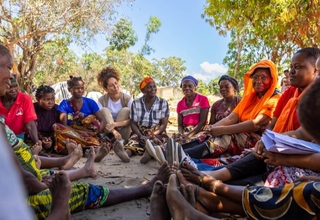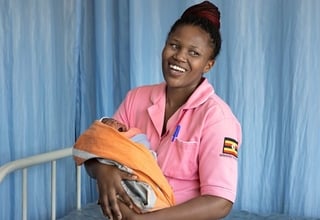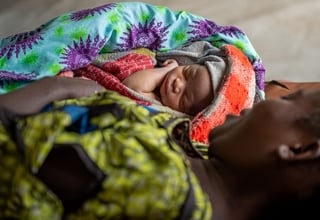CAPE TOWN, South Africa — Health and education ministers from 21 East and Southern African countries recommitted to improving comprehensive sexuality education for young people in the region, at an interministerial meeting at the 17th ICASA.

Bolivia Jeremiah, a young activist, said young people in the region are important to the development of Africa, but they carry the burden of HIV and other vulnerabilities. She called for policies and conditions to creat employment for young people and women in particular. Young people should be placed at the centre of overall national development as they are the leaders of tomorrow, she said.
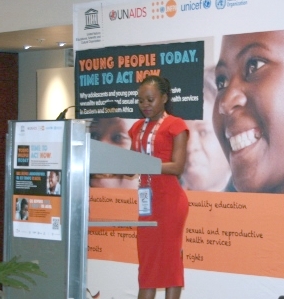
The ministers met to review and sign a new political commitment with key actions and short-term and long-term targets for making a difference in the lives of young people. The initiative, Young People Today – Time To Act Now, sought to ensure that all young people aged 10-24 years receive comprehensive sexuality education and have access to sexual and reproductive services. The goal is to reduce the high rates of HIV, unintended pregnancy, maternal deaths, and gender-based violence experienced by young people today.
The Commitment document would help take the region closer to achieving the millennium development goals (MDGs) and to prepare for the post-2015 development agenda, she said.
‘Madiba is with us in spirit’
Just two days after the death of Nelson Mandela, Dr. Onabanjo took a moment to reflect on his life and legacy: “I believe strongly that Madiba is with us in spirit this morning and with his special smile that brings warmth and comfort to all, and especially to young people."
She congratulated the ministers on the affirmation they were to make at the meeting to commit to working towards a vision for the adolescents and youth of East and Southern Africa. This was a vision of “young Africans who are empowered, resilient, strong, and socially responsible,” she said, “with capacities and capabilities that will drive and sustain regional and global development in the decades ahead.”
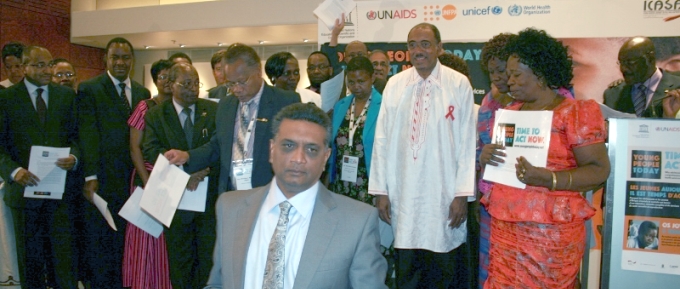
‘Let’s harness the demographic dividend’
She also congratulated the countries in the East and Southern Africa region for the realisation and affirmation of major growth in the youth population. “Africa is a youthful continent, with 33 per cent of the population aged 10-24. Experience teaches us that when countries have large numbers of young people who enter the workforce, a special window opens up for faster economic growth and development; we call this a window of opportunity or the ‘demographic dividend’,” she said.
Harnessing the demographic dividend required making the right investments. To capitalize on this dividend, an important first step was to increase investment in the holistic development of adolescents and young people in all ESA countries. “Increasing access to comprehensive sexuality education and quality youth friendly services is critical ingredient of this investment,” she said.
Ministers are making the right choices
Adolescent childbearing had to decline so that there are fewer children to support with social services and more educated and skilled young adults who could speed up economic growth. “Improving the quantity and quality of education, especially for girls, is important for creating a skilled labour force that is able to respond to the current knowledge-based economy. Nations also need smart policies and dynamic economic conditions to create employment opportunities for young men and women,” she said. “The demographic dividend is dependent on the right investments in young people so they are healthy, educated, and have access to jobs.”
Dr. Onabanjo commended the ministers for making the right choices in investment in quality and universal education, “and more specifically here today, the affirmation of your commitment to invest in comprehensive, life skills-based sexuality education for all.” Their investment in universal and high quality health care would help ensure that young people, and especially girls, were protected from early and unintended pregnancies, from unsafe abortion, from STIs and from HIV, she said.
Opening of Community Village
At a special opening ceremony for the Community Village at ICASA on 7 December, Dr. Onabanjo said that without strong ownership by communities, the three essential freedoms that UNFPA works towards in the East and Southern Africa region would not be achieved. Thes are freedom from maternal death, so that every childbirth is safe; freedom from unintended pregnancy, so that every pregnancy is wanted; and freedom from new HIV infection, so that every young person fulfills their potential.
“We need to go beyond reaching individuals towards strengthening positive community norms, while working with communities to bring the change that is needed. Without your leadership as communities we cannot achieve sustainable development. With you in the lead we shall succeed in building health systems and healthy communities in Africa around equality, access and accountability,” she said.


